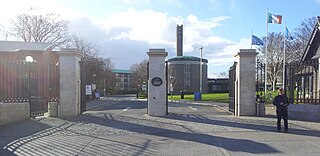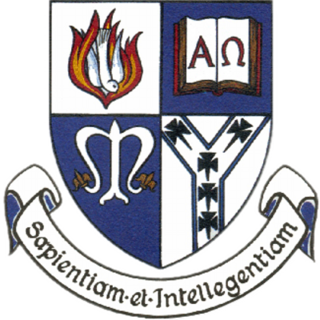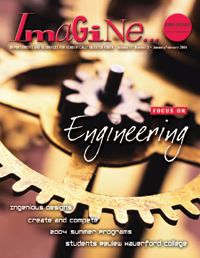
The Johns Hopkins Center for Talented Youth (CTY) is a gifted education program for school-age children founded in 1979 by psychologist Julian Stanley at Johns Hopkins University. It was established as a research study into how academically advanced children learn and became the first program to identify academically talented students through above-grade-level testing and provide them with challenging learning opportunities.

Dublin City University is a university based on the Northside of Dublin, Ireland. Created as the National Institute for Higher Education, Dublin in 1975, it enrolled its first students in 1980, and was elevated to university status in September 1989 by statute.

St Patrick's College, often known as St Pat's, was a third level institution in Ireland, the leading function of which was as the country's largest primary teacher training college, which had at one time up to 2,000 students. Founded in Drumcondra, in the northern suburbs of Dublin, in 1875, with a Roman Catholic ethos, it offered a number of undergraduate courses, primarily in primary education and arts, and in time postgraduate courses too, mostly in education and languages.

Mater Dei Institute of Education was a linked college of Dublin City University from 1999 until its closure in 2016, located in Drumcondra, Dublin City, Ireland, near Croke Park, on the site of what was formerly Clonliffe College, the Roman Catholic Seminary for the Archdiocese of Dublin. The college was founded by Archbishop John Charles McQuaid in 1966 as an institute for the training and formation for teachers of religion in secondary schools in the Republic of Ireland. Clonliffe was also affiliated to the Angelicum in Rome that offered a three-year course leading to a diploma and a four-year course leading to a Masters; Fr. Joseph Carroll was its first president. Other Presidents of the College included Msgr. Michael Nolan, Dr. Dermot Lane and Sr. Eileen Randles IBVN(1986-1995). The foundation of the college was a response to the challenges posed by the Second Vatican Council. It had a Roman Catholic ethos and had approximately 800 students.

All Hallows College was a college of higher education in Dublin. It was founded in 1842 and was run by the Vincentians from 1892 until 2016. On 23 May 2014, it was announced that it was closing because of declining student enrollment. The sale of the campus in Drumcondra to Dublin City University was announced on 19 June 2015 and completed on 8 April 2016. The college closed on 30 November 2016, becoming the All Hallows Campus of Dublin City University.
A resident assistant (RA), also known by a variety of other names, is a trained peer leader who coordinates activities in residence halls in colleges and universities, mental health and substance abuse residential facilities, or similar establishments.

A summer camp or sleepaway camp is a supervised program for children conducted during the summer months in some countries. Children and adolescents who attend summer camps are known as campers. Summer school is usually a part of the academic curriculum for a student to make up work not accomplished during the academic year.

Third-level education in the Republic of Ireland includes all education after second-level, encompassing higher education in universities and colleges and further education on Post Leaving Certificate (PLC) and other courses. The degree-awarding institutions which can grant awards at all academic levels are the University of Dublin, National University of Ireland, University of Limerick, Dublin City University, Technological University Dublin, the Royal College of Surgeons in Ireland, Munster Technological University, Technological University of the Shannon: Midlands Midwest, Atlantic Technological University and South East Technological University, as well as St Patrick's College, Maynooth. Quality and Qualifications Ireland, a State agency, can grant awards in other institutions directly, or delegate the authority to do so. The King's Inns of Dublin has a limited role in education specialising in the preparation of candidates for the degree of barrister-at-law to practice as barristers. Medical schools in Ireland also have particular regulation. There were seven establishments of higher education within Ireland ranked among the top 500 universities worldwide by the Times Higher Education Supplement in 2023.
Residence Life is the comprehensive program that surrounds the experience of living "on and off campus" in a residence hall at a college or university. Residence Life is usually structured with planned events, a code of conduct and ethics, and a relatively large array of staff.

The Education Program for Gifted Youth (EPGY) at Stanford University was a loose collection of gifted education programs formerly located within Stanford Pre-Collegiate Studies program. EPGY included distance and residential summer courses for students of all ages. Many of the courses were distance learning, meaning that courses were taught remotely via the Internet, rather than in the traditional classroom setting. Courses targeted students from elementary school up to advanced college graduate. Subjects offered included: Mathematics, English, Humanities, Physics, and Computer Science. Stanford Pre-Collegiate Studies is similar to the Center for Talented Youth at the Johns Hopkins University in terms of certain objectives. The EPGY courses themselves were offered by a number of institutions including Stanford and Johns Hopkins.
The School and College Ability Test (SCAT), is a standardized test conducted in the United States that measures math and verbal reasoning abilities in gifted children.
SiMY is a youth and community development project that works alongside young people and their families in Townhead and the surrounding areas of Glasgow City Centre. SiMY predominantly works with 8- to 18-year-olds, and most of this work takes place in the outdoors. Although SiMY's youth activity program is driven by the aims and aspirations of the young people, it typically includes physical and mental wellbeing games, hillwalking, swimming, climbing, biking, forest bathing, arts, crafts, and music. While these activities might sound like fun, they have a serious side, focussing on five interconnected development areas: mental wellbeing, physical wellbeing, self-confidence and self-expression, building social skills and reducing social isolation, and nurturing a sense of agency. SiMY's focus on outdoor youth work, draws on the Scandinavian concept of ‘friluftsliv’; outdoor living, in order to give participants the maximum exposure to the proven mental and physical health benefits of spending time in natural green, and blue, spaces.

Imagine is a defunct educational periodical for 7th-12th graders that was published by the Center for Talented Youth (CTY) at Johns Hopkins University. It is intended to provide intellectual stimulus for students looking toward their college years. Each issue focuses on an academic theme such as engineering, social sciences, archaeology, or robotics, that a younger student might not be exposed to in the course of primary or secondary education. The magazine also features, among other things, student-written articles about summer and extracurricular activities, reviews of selective colleges, book reviews, interviews with accomplished people, puzzles, college planning advice, and career options information. Contests for Imagine readers were held at times, with topics ranging from essay competitions to photo contests. In 2004, 2005, 2006 and 2007 Imagine was awarded the Parents' Choice Gold Award for magazines. The editor was Melissa Hartman of Johns Hopkins University, CTY.

The Arkansas Governor's School is a publicly funded four-week residential summer program offered to rising seniors in the state of Arkansas. The school typically accepts around 400 students each year.
The Centre for Deaf Studies is part of the School of Linguistic, Speech and Communication Sciences, Trinity College Dublin and is the only university offering Deaf Studies related courses on the island of Ireland.
St Aidan's C.B.S. is an Irish Christian Brothers secondary school under the trusteeship of the Edmund Rice Schools Trust located on Collins Avenue, Dublin. It is beside Dublin City University. Most St Aidan's students have progressed from the local primary schools such as Larkhill Boys National School; Our Lady of Victories, Ballymun; St Patrick's National School, Drumcondra; and St Fiachra's School, Beaumont.
The Milltown Institute of Theology and Philosophy was a Jesuit-run institution of higher education and research, located in Dublin, Ireland. It was located in Ranelagh, County Dublin.

The National Academy for Gifted and Talented Youth (NAGTY) was based at the University of Warwick and was founded in 2002 by a government (DfES) initiative for high-achieving secondary students in England. It closed in August 2007, after Warwick University decided not to apply for the new contract.

AMU Malappuram Centre is one of the prominent educational institution of Aligarh Muslim University in south India in the state of Kerala in Malappuram district near Perinthalmanna at Cherukara post. It was established in 2010 by the ministry of Human resource and Development, central government of India. The President of India in her capacity as the Visitor accorded sanction to establish two Centers of Aligarh Muslim University, one at Malappuram and the other at Murshidabad in 2010.












